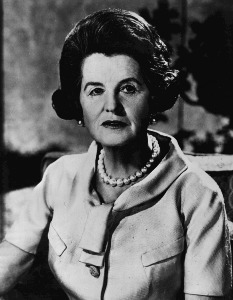
Rose Marie “Rosemary” Kennedy, the third child born to the prominent political Kennedy family, spent many years in the background of various family members’ success. A tragic incident at birth left Rosemary intellectually disabled. The remainder of her life was filled with rejection and sadness amidst her struggle to survive.
On September 13, 1918, Rose Fitzgerald Kennedy went into labor with her third child at the Kennedy family home in Boston. Her doctor was not available to deliver the baby immediately, which prompted Mrs. Kennedy’s in-home nurse to take drastic measures to prevent the birth. After the nurse delayed birth for two hours, Rosemary was born suffering from an extreme loss of oxygen.
Rosemary grew up with “backwardness,” as her father, Joseph Sr., called it. She had intellectual disabilities and behavioral problems. Throughout her early life, her parents moved her from boarding school to boarding school. But even with private tutors, she had a hard time learning. And when Rosemary was a teenager, her parents chose to subject her to an experimental hormone injection in hopes of “fixing” their daughter.
In 1938, Mr. Kennedy became the U.S. Ambassador to England and moved his family to London. There, at age 20, Rosemary thrived while training to become a Montessori teacher’s aide. However, World War II cut this positive experience short. The Kennedys moved to New York in 1939, and Rosemary followed suit in 1940.
Soon after arriving in New York, Rosemary became increasingly violent. The well-being she experienced abroad dissipated. Hoping to help their daughter, the Kennedys sent Rosemary to more boarding schools, but she was continually expelled or withdrawn by them before she could be expelled for poor behavior. The Kennedys always maintained a keen interest in upholding their perfect family image to the public. They wanted Rosemary’s struggles to remain in the shadows.
Desperate to keep Rosemary out of the public eye, Mr. Kennedy made a decision that would forever alter her life: he decided Rosemary would have a lobotomy. In 1941, at age 23, Rosemary underwent the dangerous surgical procedure, which involves drilling two holes in the brain while one is fully conscious to cut nerve endings.
Mr. Kennedy hoped the procedure would curb his daughter’s behavioral issues. Instead, however, the surgery caused Rosemary to lose the use of one arm and walk with a limp for the rest of her life.
After her surgery, Rosemary settled in Wisconsin. Here, her father visited her until 1948, but her mother did not visit for over 20 years. When Mrs. Kennedy finally arrived to pay her a visit, Rosemary did not want to see her.
Rosemary died in 2005 at the age of 86. No longer a Kennedy family secret, her story has paved the way for bettering the lives of people with disabilities. Rosemary’s younger sister, Eunice Kennedy Shriver, convinced their father to donate funds to research on disabilities. Eunice also influenced their brother and former President John F. Kennedy to establish the National Institute of Child Health and Human Development. Further, the youngest Kennedy child, former Senator Ted Kennedy, had Rosemary in mind when he helped create the Americans with Disabilities Act (ADA).
Throughout her life, Rosemary’s disability was misunderstood. She was consequently mistreated and struggled for decades. Because of her and many others, we now better understand how to improve the lives of people with disabilities in America.
[Source:
The New York Times
]

